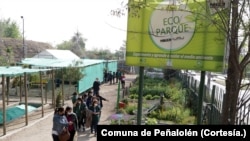Twelve years ago, Carolina Leitao became mayor of the Peñalolén commune, in the southeastern sector of Santiago de Chile. She arrived with the aim of promoting environmental policies to face the climate crisis. Her moves have been pioneering, and many local governments in the region are now following the lead she laid out a decade ago.
Pioneering initiative in the region
Leitao, who is also the president of the Chilean Association of Municipalities, has been invited by the Summit of Cities of the Americas promoted by the United States government to share her success story with the more than 3,500 participants who will meet this Wednesday Rendezvous in Denver, Colorado.
“For some years we have been developing a local adaptation plan for climate change and to face it, and that means having to promote initiatives that affect waste management, water saving and the protection of biodiversity,” he commented. the woman during an interview with the voice of america, defending that “we have also promoted energy saving initiatives and we have already applied many projects in the governmental sphere to be able to finance solar panels and heat pumps”.
When policies were “environmental” and not “climate change”
He began to be interested in the climate issue due to “the desertification of the ravine” and a “flood that occurred many years ago in which families also died” from the commune of Chile. “The effects that this had had began to be seen there, with heavy rains in a few hours, with a lot of heat, etc., and that was generating an earlier awareness,” she says.
He does not want to detract from his predecessors, such as Claudio Rebo, the current governor of Santiago, who was also mayor of Peñalolén. “He started with the first initiatives to protect the ravine, with the first intervention plans that were called environmental because they still did not have the concept of climate change as such,” he explains.
But Leitao, upon reaching the mayor’s office, made progress in these climate policies, agreeing that the climate issue “began to be part of the dialogue and world agendas.”
“All these initiatives that we were developing were turned to this plan to deal with climate change.”
Globally recognized environmental policies
The policies that she has been leading from Chile have been recognized by the Carbon Disclosure Project (CDP), one of the most prestigious organizations in the world, which oversees the climate measures implemented by public administrations and companies through studies of greenhouse gas emissions.
“We have dared to measure ourselves and last year we were qualified in the most important CDP measurement list,” explained the satisfied lawyer.
She had the initiative to implement, a few years ago, some changes to face the consequences of climate change and global warming. Now it is seeing the results and other municipalities in the country have joined it to promote joint policies in this regard.
The high cost of promoting climate policies
He admits that one of the main challenges the region has to face is trying to convince the governments of the weakest economies of the importance of promoting environmental policies.
“It is true that promoting initiatives in the environmental field has a high cost because, for example, recycling is more expensive than having a landfill or a waste treatment area,” he explained.
Despite this, he stressed that “it is necessary that we can promote these initiatives so that innovation and new technologies are also developed that help us lower the costs of what it means to develop initiatives on environmental issues.”
But Carolina Leitao believes that awareness campaigns should be carried out so that the population understands the importance of applying climate policies on a small scale.
“Unfortunately, human beings are shock therapy, it is very difficult for us to understand ahead of time. And I believe that this is also our task, how we raise awareness so that people become aware thinking about the country and the city that we want to leave, ”she argued.
“Convince the unconvinced”
Given this, he warns that “if we do not act today, the results for the future look very inauspicious.” For this reason, she is convinced that from the local level one can end up “affecting the global”, although she admits that the most important thing “is to convince the unconvinced” of the climate issue.
“I think that we are the mayors, those of us who are in the territory, the ones who are more aware of the problem, more than the states or the countries. What we have to do is try to unite to influence policies, programs, global financing, to be able to develop initiatives, and obviously those who are not convinced will leave here convinced”, he concluded.
Connect with the Voice of America! Subscribe to our channel Youtube and activate notifications, or follow us on social networks: Facebook, Twitter and Instagram.







![[Img #74683]](https://thelatestnews.world/wp-content/uploads/2024/12/The-main-mistakes-to-avoid-when-betting-on-electronic-sports-150x150.jpg)









